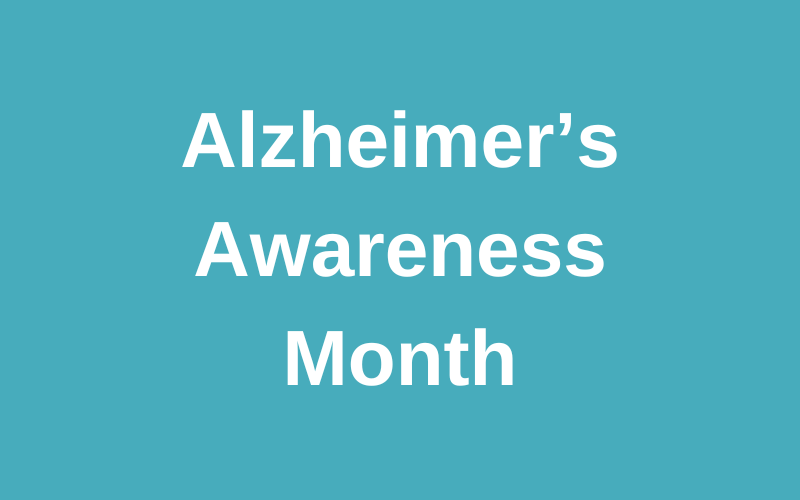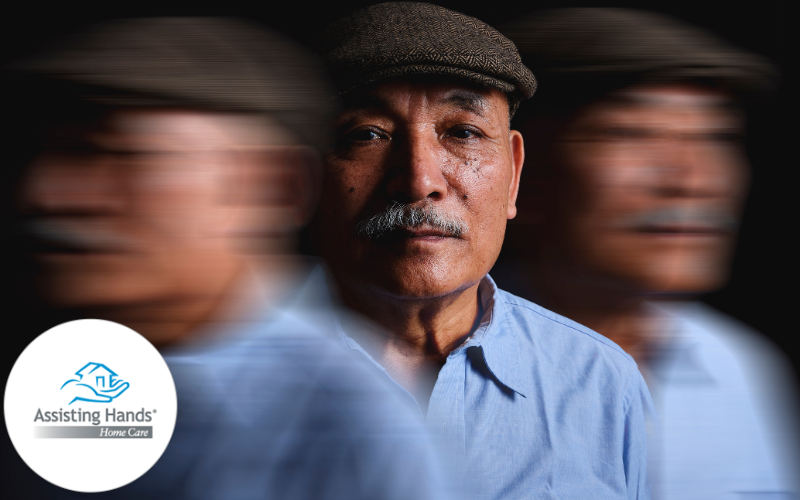
Alzheimer’s Awareness Month offers families, caregivers, and communities an opportunity to show their support for the over six million Americans courageously battling this progressive brain disease. As of yet, there is no cure, making it more important to help affected seniors live their best lives.
How does Alzheimer’s disease start?
Although Alzheimer’s disease predominantly affects older adults, it is not a normal part of aging. The root cause of the disease is still being researched; but experts believe Alzheimer’s is due to brain damage that results when misfolded proteins build up between nerve cells.
This damage can begin ten or more years before symptoms of Alzheimer’s disease manifest. Symptoms include memory loss, poor judgment, loss of initiative, and taking longer to complete daily tasks. Affected seniors repeat questions, wander, or misplace possessions in odd places.
What are symptoms of Alzheimer’s?
Older adults living with Alzheimer’s experience mood and personality changes. They may become more anxious or aggressive, lashing out unexpectedly. The disease affects communication skills, and seniors have great difficulty verbalizing wants and needs, carrying out conversations, and finding the right words.
Symptoms of Alzheimer’s significantly impact the senior’s daily life. As the disease progresses, they require more help with the activities of daily living. At the final and most severe stage of Alzheimer’s, the older adult relies entirely on a caregiver to complete everyday self-care tasks.
What is Alzheimer’s Awareness Month?
The effects of Alzheimer’s are devastating, robbing individuals of their memories, thoughts, and even identities. The 11 million unpaid caregivers and the nation’s health systems are strained by the three million Americans who are newly diagnosed each year with the disease.
The Biden administration brought hope to the growing number of Alzheimer’s patients. In 2022, it launched the Advanced Research Projects Agency for Health at the National Institutes for Health to perform research for the prevention, treatment, and cure of Alzheimer’s and other diseases.
Congruently, the US Department of Health and Human Services invests in research and technologies to improve the lives of seniors living with the disease, helping them live longer in their own homes, training caregivers to support them, and educating Americans on the early symptoms.
When President Biden proclaimed November as National Alzheimer’s Awareness Month, he urged fellow Americans to recognize their friends, neighbors, and family members who were diagnosed with the disease and honor the caregivers and professionals who compassionately support them every day.
How do people observe Alzheimer’s Awareness Month?
1. Choose Teal
The Alzheimer’s Awareness color is teal. The Alzheimer’s Foundation of America (AFA) chose this color for its calming effects. Especially for people living with Alzheimer’s, decorating, or designing their living spaces with furniture and accessories in a teal color can be welcoming and comforting.
Raising awareness and support of Alzheimer’s disease is also done on a national level. Last year, 800 structures, from city office buildings to college campuses, turned on teal lights to demonstrate their unwavering support for the millions of people affected by this disease.
Community members can likewise show their support by wearing teal-colored t-shirts and other clothing. Raise further awareness by updating social media cover photos with images in teal. Use the hashtag #WhyIGoTeal in all social media posts to join the conversations online.
2. Share Posts on Social
Similarly, utilize the power of social media to share information about the disease and raise further awareness. Post facts about Alzheimer’s as well as tips for healthy aging. End with the hashtag #AlzheimersAwarenessMonth to organize the posts so that others can participate.
3. Shop the AFA Store
Shop the Alzheimer’s Foundation of America store for picture care phones, healthy brain boxes, and AFA stress balls. The organization offers a line of Hearts of Care jewelry, such as necklaces and bracelets. Stop signs can prevent wandering and calendar magnets help seniors remember what day it is.
4. Get A Memory Screening
A wellness routine includes a memory screening. The AFA offers its National Memory Screening Program, allowing older individuals to receive a complimentary, one-on-one memory screening with qualified professionals. The screening can be done virtually via a computer, smartphone, or tablet.
5. Participate in a Clinical Trial
Finding a cure for Alzheimer’s is still underway, but healthy individuals and people with Alzheimer’s who seek to support the cause can volunteer for a clinical trial. Clinical trials are critical to helping researchers find better treatments, preventions, and possibly a cure.
Each individual, from a family member to a caregiver and a senior living with Alzheimer’s, can make a significant difference in treatment and finding a cure. Alzheimer’s Awareness Month can provide the incentive to learn more about the disease, share knowledge, and drive awareness.
Spend time this November in observance of Alzheimer’s Awareness Month. Educate others and find dependable support for a loved one living with the disease. Assisting Hands Home Care offers quality memory care for seniors affected by any stage of Alzheimer’s or other types of dementia.
Our reputable home care agency provides in-home memory care services for individuals living with Alzheimer’s disease and needing consistent care in Coppell, TX | Dallas, TX | Highland Park, TX | Richardson, TX | University Park, TX and the surrounding areas. Home care is preferred, as seniors have the opportunity to remain in familiar surroundings; this prevents disorientation and promotes security.
Responsibilities our caregivers undertake include discreetly assisting with incontinence issues, which commonly affect dementia patients. When older adults wander, we accompany them to ensure they do not leave home. Agitation is effectively managed with distraction techniques. Care options range from respite care to overnight care.
Additionally, our non-medical care services include light housekeeping, medication reminders, healthy meal preparation, and grocery shopping. Professional caregivers provide reliable transportation to doctors’ offices and senior centers. We’re ideal companions who keep seniors socially active and mentally stimulated with games, outings, and leisure activities.
Seniors living with Alzheimer’s disease should never be left alone. The supervision and care provided by Assisting Hands Home Care ensure that the elderly remain safe and in good health. We serve the aging population in the North, Texas. Call us today at (214) 760-6944 to schedule a free in-home consultation.







